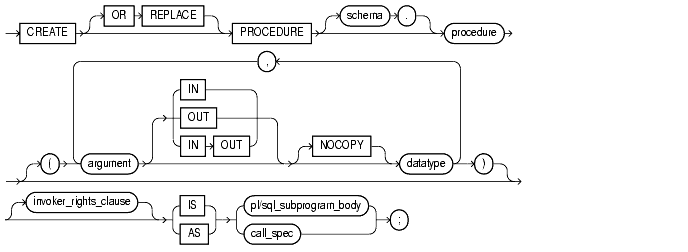Release 3 (8.1.7)
Part Number A85397-01
Library |
Product |
Contents |
Index |
| Oracle8i SQL Reference Release 3 (8.1.7) Part Number A85397-01 |
|
SQL Statements:
CREATE CLUSTER to CREATE SEQUENCE, 20 of 25
Use the CREATE PROCEDURE statement to create a standalone stored procedure or a call specification.
A procedure is a group of PL/SQL statements that you can call by name. A call specification ("call spec") declares a Java method or a third-generation language (3GL) routine so that it can be called from SQL and PL/SQL. The call spec tells Oracle which Java method to invoke when a call is made. It also tells Oracle what type conversions to make for the arguments and return value.
Stored procedures offer advantages in the areas of development, integrity, security, performance, and memory allocation.
|
See Also:
|
Before creating a procedure, the user SYS must run the SQL script DBMSSTDX.SQL. The exact name and location of this script depends on your operating system.
To create a procedure in your own schema, you must have the CREATE PROCEDURE system privilege. To create a procedure in another user's schema, you must have CREATE ANY PROCEDURE system privilege. To replace a procedure in another schema, you must have the ALTER ANY PROCEDURE system privilege.
To invoke a call spec, you may need additional privileges (for example, EXECUTE privileges on the C library for a C call spec).
To embed a CREATE PROCEDURE statement inside an Oracle precompiler program, you must terminate the statement with the keyword END-EXEC followed by the embedded SQL statement terminator for the specific language.
|
See Also: PL/SQL User's Guide and Reference or Oracle8i Java Stored Procedures Developer's Guide for more information on such prerequisites |



Java_declaration::=
C_declaration::=

OR REPLACE
Specify OR REPLACE to re-create the procedure if it already exists. Use this clause to change the definition of an existing procedure without dropping, re-creating, and regranting object privileges previously granted on it. If you redefine a procedure, Oracle recompiles it.
Users who had previously been granted privileges on a redefined procedure can still access the procedure without being regranted the privileges.
If any function-based indexes depend on the package, Oracle marks the indexes DISABLED.
schema
Specify the schema to contain the procedure. If you omit schema, Oracle creates the procedure in your current schema.
procedure
Specify the name of the procedure to be created.
If creating the procedure results in compilation errors, Oracle returns an error. You can see the associated compiler error messages with the SQL*Plus command SHOW ERRORS.
argument
invoker_rights_clause
The invoker_rights_clause lets you specify whether the procedure executes with the privileges and in the schema of the user who owns it or with the privileges and in the schema of CURRENT_USER.
This clause also determines how Oracle resolves external names in queries, DML operations, and dynamic SQL statements in the procedure.
|
See Also:
|
IS | AS
|
|
In the PL/SQL subprogram body, declare the procedure in a PL/SQL subprogram body.
|
|
|
|
Use the
In
|
|
|
|
|
The |
CREATE PROCEDURE Example
The following statement creates the procedure credit in the schema sam:
CREATE PROCEDURE sam.credit (acc_no IN NUMBER, amount IN NUMBER) AS BEGIN UPDATE accounts SET balance = balance + amount WHERE account_id = acc_no; END;
The credit procedure credits a specified bank account with a specified amount. When you call the procedure, you must specify the following arguments:
|
|
is the number of the bank account to be credited. The argument's datatype is |
|
|
is the amount of the credit. The argument's datatype is |
The procedure uses an UPDATE statement to increase the value in the balance column of the accounts table by the value of the argument amount for the account identified by the argument acc_no.
In the following example, external procedure c_find_root expects a pointer as a parameter. Procedure find_root passes the parameter by reference using the BY REF phrase:
CREATE PROCEDURE find_root ( x IN REAL ) IS LANGUAGE C NAME "c_find_root" LIBRARY c_utils PARAMETERS ( x BY REF );
|
|
 Copyright © 1996-2000, Oracle Corporation. All Rights Reserved. |
|